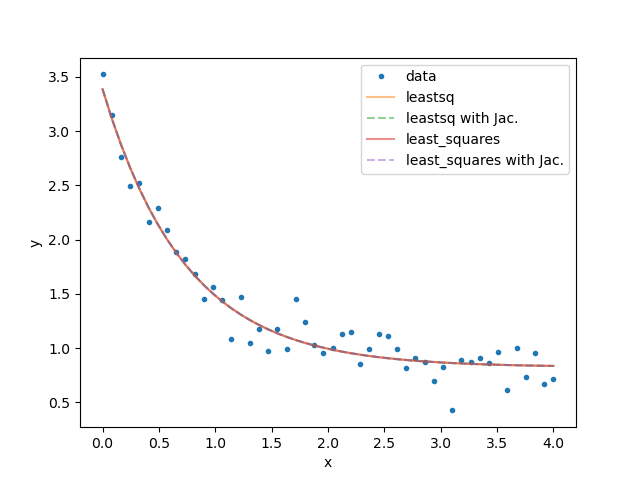Note
Go to the end to download the full example code.
Benchmarks of methods with and without computing the Jacobian analytically¶
Providing a function that calculates the Jacobian matrix analytically can
reduce the time spent finding a solution. The results from benchmarks comparing
two methods (leastsq and least_squares) with and without a function to
calculate the Jacobian matrix analytically are presented below.
First we define the model function, the residual function, and the appropriate Jacobian functions:
from timeit import timeit
from types import SimpleNamespace
import matplotlib.pyplot as plt
import numpy as np
from lmfit import Parameters, minimize
NUM_JACOBIAN_CALLS = 0
def func(var, x):
return var[0] * np.exp(-var[1]*x) + var[2]
def residual(pars, x, data):
a, b, c = pars['a'], pars['b'], pars['c']
model = func((a, b, c), x)
return model - data
def dfunc(pars, x, data):
global NUM_JACOBIAN_CALLS
NUM_JACOBIAN_CALLS += 1
a, b = pars['a'], pars['b']
v = np.exp(-b*x)
return np.array([v, -a*x*v, np.ones(len(x))])
def jacfunc(pars, x, data):
global NUM_JACOBIAN_CALLS
NUM_JACOBIAN_CALLS += 1
a, b = pars['a'], pars['b']
v = np.exp(-b*x)
jac = np.ones((len(x), 3), dtype=np.float64)
jac[:, 0] = v
jac[:, 1] = -a * x * v
return jac
a, b, c = 2.5, 1.3, 0.8
x = np.linspace(0, 4, 50)
y = func([a, b, c], x)
data = y + 0.15*np.random.RandomState(seed=2021).normal(size=x.size)
Then we define the different cases to benchmark (i.e., different methods with and without a function to calculate the Jacobian analytically) and the number of repetitions per case:
cases = (
dict(
method='leastsq',
),
dict(
method='leastsq',
Dfun=dfunc,
col_deriv=1,
),
dict(
method='least_squares',
),
dict(
method='least_squares',
jac=jacfunc,
),
)
num_repeats = 100
results = []
for kwargs in cases:
params = Parameters()
params.add('a', value=10)
params.add('b', value=10)
params.add('c', value=10)
wrapper = lambda: minimize(
residual,
params,
args=(x,),
kws={'data': data},
**kwargs,
)
time = timeit(wrapper, number=num_repeats) / num_repeats
NUM_JACOBIAN_CALLS = 0
fit = wrapper()
results.append(SimpleNamespace(
time=time,
num_jacobian_calls=NUM_JACOBIAN_CALLS,
fit=fit,
kwargs=kwargs,
))
Finally, we present the results:
labels = []
for result in results:
label = result.kwargs['method']
if result.num_jacobian_calls > 0:
label += ' with Jac.'
labels.append(label)
label_width = max(map(len, labels))
lines = [
'| '
+ ' | '.join([
'Method'.ljust(label_width),
'Avg. time (ms)',
'# func. (+ Jac.) calls',
'Chi-squared',
'a'.ljust(5),
'b'.ljust(5),
'c'.ljust(6),
])
+ '|'
]
print(f'The "true" parameters are: a = {a:.3f}, b = {b:.3f}, c = {c:.3f}\n')
fig, ax = plt.subplots()
ax.plot(x, data, marker='.', linestyle='none', label='data')
for (result, label) in zip(results, labels):
linestyle = '-'
if result.num_jacobian_calls > 0:
linestyle = '--'
a = result.fit.params['a'].value
b = result.fit.params['b'].value
c = result.fit.params['c'].value
y = func([a, b, c], x)
ax.plot(x, y, label=label, alpha=0.5, linestyle=linestyle)
columns = [
label.ljust(label_width),
f'{result.time * 1000:.2f}'.ljust(14),
(
f'{result.fit.nfev}'
+ (
f' (+{result.num_jacobian_calls})'
if result.num_jacobian_calls > 0 else
''
)
).ljust(22),
f'{result.fit.chisqr:.3f}'.ljust(11),
f'{a:.3f}'.ljust(5, '0'),
f'{b:.3f}'.ljust(5, '0'),
f'{c:.3f}'.ljust(5, '0'),
]
lines.append('| ' + ' | '.join(columns) + ' |')
lines.insert(1, '|-' + '-|-'.join('-' * len(col) for col in columns) + '-|')
print('\n'.join(lines))
ax.set_xlabel('x')
ax.set_ylabel('y')
ax.legend()

The "true" parameters are: a = 2.500, b = 1.300, c = 0.800
| Method | Avg. time (ms) | # func. (+ Jac.) calls | Chi-squared | a | b | c |
|-------------------------|----------------|------------------------|-------------|-------|-------|-------|
| leastsq | 1.63 | 39 | 1.092 | 2.564 | 1.359 | 0.824 |
| leastsq with Jac. | 1.27 | 12 (+10) | 1.092 | 2.564 | 1.359 | 0.824 |
| least_squares | 4.13 | 38 | 1.092 | 2.564 | 1.359 | 0.824 |
| least_squares with Jac. | 2.82 | 11 (+9) | 1.092 | 2.564 | 1.359 | 0.824 |
Total running time of the script: (0 minutes 1.331 seconds)
